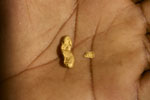
From Capitol Hill, the conflict in eastern Congo can feel a world away, but a Congressional committee this week took up an important question: What are the implications of the conflict there on U.S. national interests and stability in the wider Great Lakes region of Africa?
On Tuesday, the House Armed Services Committee’s Subcommittee on Terrorism, Unvonventional Threats, and Capabilities called a panel of experts to discuss these dynamics. Enough’s Co-founder John Prendergast testified on the issue of conflict mineral certification and regional security. Additionally, the subcommittee heard from Ted Dagne, African affairs specialist at the Congressional Research Service, and Adam Komorowski, Africa regional head of operations for the Mines Advisory Group.
Just 48 hours after returning from the region, John provided the subcommittee with poignant and compelling testimony about the world’s deadliest conflict since World War II. Summarizing his written statement, John outlined the next two major steps that Congress and the administration should pursue to catalyze real change on the ground in the Congo.
With the inclusion of the conflict minerals provision in the Dodd-Frank Wall Street Reform Act passed by Congress in July, the ball is now in the SEC’s court to impose robust guidelines for the provision’s implementation. Congress and the Obama administration must now work closely with other regional actors to implement a mineral certification process similar to the schemes that helped stifle the trade in blood diamonds that fuelled wars in Angola, Sierra Leone, and Liberia and to lead a multi-donor, coordinated, and comprehensive security sector reform effort.
John explained that creating a mineral certification process would tip the incentives structure in the eastern Congo from one that allows profitability from violent extraction to one that rewards peaceful, legal mining. Numerous armed groups in the region profit from and subsist upon the illegal minerals trade. A certification scheme would effectively undercut their resources, which, over time and in conjunction with other efforts to address root causes of conflict, would minimize atrocities against the civilian population.
Addressing the illicit conflict minerals trade provides an opportunity to begin sweeping security sector reform in eastern Congo. As the U.N. Group of Experts report released this week details, the Congolese army is one of the primary sources of instability in the region. John described to the subcommittee how professionalization of the Congolese forces and implementation of a military justice system would go a long way in reducing atrocities currently proliferating at epidemic levels, and helping the army transform from being a force that is largely culpable for violence to one that effectively protects civilians from it.
Members of the subcommittee were responsive to the testimony and asked specific and targeted questions that demonstrated their engagement with the issue and their acknowledgement that the conflict in the eastern Congo is worthy of American attention.
As John remarked to the subcommittee, “In 25 years of visiting and working and living in the Congo, I think this is the first time anyone’s taken [the crisis] seriously.” It is time now to build upon this unprecedented momentum and press U.S. lawmakers and officials to demonstrate leadership through the crucial next steps: creation of a regional mineral certification process and comprehensive security sector reform.
Click here to watch the archived video of the hearing.
Photo: Gold in palm of a miner (Enough/Sasha Lezhnev)

